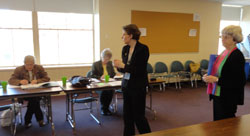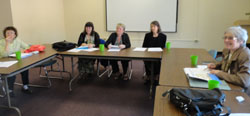September 24, 2018
Mercy Day
On Sunday, 12 May, Mercy International Association embarked upon a training week in the United Nations Headquarters in New York. Entitled the ‘U.N. Experience’, its purpose was to provide training in policy and advocacy for Mercy Sisters and their associates involved in justice work.

The two issues that the Mercy congregations focus on at an advocacy and policy level are Human Trafficking and Eco Justice. According to Mary, these two issues were chosen, because “we found that they were already of concern to Sisters of Mercy working on the ground in their own countries”.
In the area of Human Trafficking, Mary describes some of the work that the Sisters of Mercy carry out. “Their work includes supporting trafficked women; providing shelter to help them to leave situations they’re in; campaigning for housing services; helping trafficked women in court cases against a trafficker; and basic provisions such as helping them to get back into work or with skill training.”
Regarding Eco Justice, Mary says that the issue of mining arose repeatedly. “Some of the problems facing people regarding mining include families being forced from their land, water contamination, air-pollution and a general disruption of communities.”
With Sisters of Mercy beginning to create a strategic plan for their work on these two issues, an event such as the U.N. Experience is vital. Not only do trainees learn skills to help them develop a plan of action, it also supports them to lobby at a national level.
Four key goals were identified for the training week. Exposure to the U.N. was important, with the trainees given the opportunity to sit in on sessions of the working group on climate change and trafficking. Trainees also had the chance to identify their country’s representatives at the sessions, meaning they could speak directly with them, which helped to develop their lobbying techniques and skills. The practical element of the week was essential too, with trainees learning how to write policy submissions and gaining experience of good practice from around the world.
Finally and perhaps most importantly, was the opportunity for the trainees to develop their own work plan for the year and to determine personal advocacy plans for their own countries. Mary says this was perhaps the most important outcome of the week. “The trainees left with a plan of their objectives, how they will go about their activities, what months they will do the work, indicators for their work – how they will know it’s successful. And then over the following year, M.I.A. will be involved with them, monitoring developments throughout the year and examining the progress made.”
A further, important part of the training week was the theological aspect of the work undertaken by the Sisters of Mercy. While the training is with regards to advocacy and policy, it takes place within the context of theological reflection. Pat Fox, Mercy Theologian presented the theological aspect of the training, to facilitate all of the analysis within the context of theological reflection. For the Sisters and their associates working at the grass roots level, the ethos of Mercy is their motivation in the work they do. As Mary says, ‘it is the guiding force for the sisters and it is what empowers them to do this work.’

Not only do the congregations of the Sisters of Mercy join forces, they also collaborate with other religious orders and groups who are sympathetic to the issues they are working on, which has seen successful results. Along with other groups, the Sisters of Mercy lobbied at both a national and international level regarding ‘The Future We Want’, the outcome document adopted at Rio+20, the U.N. conference on sustainable energy. The result was the inclusion of three pieces which had originally been left out of the document.
When the Sisters of Mercy see the results of their challenging work, it is a great victory and provides an incentive to carry on with their work. Consequently, training events such as the U.N. Experience are extremely important. “If we can give Sisters of Mercy and their associates the experience to effectively lobby their governments, we can see the impact this will have” says Mary.
The training week was attended by ten people from six congregations, including representatives from U.S.A., Ireland, Philippines, New Zealand, Papua New Guinea, Australia and Newfoundland.
Messages to: Mary Purcell - Assistant Director Mercy Global Action